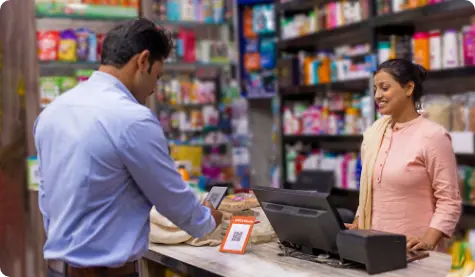
ANNUAL REPORT 2023-24


Strengthening our operational resilience and enhancing delivery systems to achieve sustainable growth.
The retail business continued to be a key driver of growth in fiscal 2024, as we pursued a strategy of building a diversified and granular loan portfolio. The Bank’s retail portfolio grew by 19.4% year-on-year to ₹ 6,662.61 billion at March 31, 2024. Retail loans accounted for 54.9% of total loans, and including non-fund based outstanding, the share was 46.8% in the total portfolio. The Bank has undertaken several initiatives to offer a convenient and frictionless experience to customers by digitising the entire underwriting process, with instant loan approvals.
In order to capture the growing opportunities in rural market, the Bank has merged retail and rural business groups within one structure which reflects the Bank’s increasing focus towards rural India. The Bank’s rural portfolio grew by 17.2% year-on-year to ₹ 1,024.46 billion at March 31, 2024, accounting to 8.4% of the total portfolio. The Bank offers a diverse set of products catering to endto-end needs in the value chain. The Bank also provides consumption loans for low-income customers. Financial solutions are offered to micro-finance institutions, Self-Help Groups (SHGs), co-operatives constituted by farmers and corporations and Small and Medium Enterprises (SMEs) engaged in agriculture-linked businesses.
The Bank’s strategy to serve the rural segment of the economy is based on the integrated nature of the rural ecosystem. The Bank has identified four main ecosystems in the rural market to enrich the banking experience for its habitants. These ecosystems include farmers, dealers, self-employed, and micro-entrepreneurs. The farmer ecosystem includes participants like agriculturists, seed producers, agri-input dealers, warehouses, agri-equipment dealers, commodity traders and agri processors.

Products offered include working capital loans through the Kisan Credit Card (KCC) and gold loans and term loans for farm equipment, and farm development. The dealer ecosystem comprises dealers/distributors of farm equipment, and various inputs and ancillary suppliers related to rural economy. The self-employed ecosystem comprises rural entrepreneurs who are engaged in trading and manufacturing activities based out of commercial and industrial areas in the rural market dealing with both agri & non-agri related products. The micro-entrepreneurs lending space includes women from the lower-income strata of the population, non-government organisations and other institutions working at the grassroots level in the rural economy. The operational structure and offerings put the Bank in a unique position to leverage opportunities in different ecosystems within the rural markets.
The Bank’s reach in rural areas comprises a network of branches, ATMs, field staff and business correspondents providing last-mile access in remote areas. Of the Bank’s network of 6,523 business centres, 50.7% are in rural and semi-urban areas. Including the Business Correspondent Agent network, the Bank covers over 9,940 rural locations. There were over 4,600 ATMs at semi-urban and rural centres at March 31, 2024 having a proportion of 27% out of the total number of ATMs pan India.
The Small and Medium Enterprises (SME) and Business Banking portfolio comprises exposures to companies with a turnover of up to ₹ 2.50 billion. The SME and Business Banking portfolio grew by 27.4% to ₹ 1,533.23 billion at March 31, 2024, accounting for 12.7% of the overall portfolio.
The growth in the portfolio was driven by the Bank’s approach of catering to 360° needs of customers across business life cycle ranging from onboarding, payment & collection, cross-borders, account reconciliation besides working capital requirements. Envisaging these customer requirements, the Bank devised comprehensive digital solutions & platforms which are also fulfilled through Do-it-Yourself (DIY) and Do-It-for-Me (DIFM) through our business centres, InstaBIZ mobile apps and the Bank’s website and partner websites. In addition, a dedicated Relationship Manager completes the Bank’s approach to providing full 360° solutions to its customers.

The Bank’s focus in these businesses continues to be on parameterised and programme-based lending, which is granular and well-collateralised. The Bank has devised an integrated underwriting approach which is scorecard driven. Leveraging digital tools and data analytics, the Bank has built a couple of scorecards namely Unicore and Infinity, which cater across customers, turnover ranges and loan ticket size. A combination of qualitative and quantitative assessment tools is utilised to arrive at the final credit decision. Additionally, to cater specifically to the micro segment, the Bank has put in place a surrogate programme-based underwriting process on documents such as bank statement and Goods and Services Tax (GST) returns for credit assessment.
The Bank maintains a robust risk management framework to manage the SME and business banking portfolio. The Bank constantly monitors and analyses the portfolio to detect stress, thus enabling the Bank to take early action and ensuring healthy portfolio quality. The Bank has further strengthened its underwriting process by integrating various digital tools like bank statement analyser, automatic fetching of bureau reports and enhanced business rule engine to generate probability of default scores for score-based analysis.
The Bank’s wholesale banking customers include large private sector business houses and companies, banks and financial institutions, public sector undertakings and central and state government entities. The Bank’s wholesale banking portfolio grew by 10.0% year-on-year to ₹ 2,582.79 billion at March 31, 2024, accounting for 21.3% of the total portfolio. The Bank also has a strong franchise among Multi-National Corporations (MNCs), real estate companies, IT & ITeS and new-age services companies, along with the financial sponsors space with special focus on private equity funds and their investee companies. Additionally, the Bank also caters to the requirements of the capital market participants and custody service providers through digital solutions improving their operational efficiency.
The Bank’s approach has been to deepen partnership with its clients and provide support to clients through their entire life cycle. The Bank caters to various needs of the clients across trade, treasury, bonds and commercial papers through its comprehensive and technologically advanced delivery platforms while also catering to the needs of their supply chain network.

The Bank aims to become a business partner to its clients instead of merely being a capital provider. With the client at the centre, all teams across the Bank are well-aligned to offer the entire Bank’s offerings to wholesale clients and their ecosystems. This has not only made client servicing more effective, but also helped in deepening the Bank’s relations in high-value retail accounts of senior client personnel and employees through a suite of retail products like salary, private and wealth banking, home loans, personal loans and vehicle loans.
Supply chain financing is an integral part of the corporate ecosystem and solutions like CorpConnect and DigitalLite enable corporates to seamlessly manage supply chain financing, payments, collection and reconciliation requirements of their dealers and vendors in a convenient and paperless process. These solutions also automatically assess the eligibility of the client’s dealers and vendors for credit through a business rule engine, GST returns, intelligent algorithm with automated bureau checks and dedupe checks.
The Bank has extensively leveraged analytics to monitor transactions and the portfolio quality. While new credit is extended in a granular manner to well-established and well-rated business groups, data analytics is used for portfolio monitoring and identification of early warning signals in the existing portfolio. This has led to enhancement of the overall quality of the corporate portfolio.
ICICI Bank’s international presence consists of business centres in six overseas locations and representative offices in ten locations outside India. The Bank’s overseas book was ₹ 334.51 billion at March 31, 2024, accounting for 2.8% of the total portfolio. The Bank has an IFSC Banking Unit (IBU) in GIFT City Gujarat, an Offshore Banking Unit (OBU) in Mumbai, and wholly-owned subsidiaries in the United Kingdom (UK) and Canada.
The Bank’s international franchise focusses on four strategic pillars, namely the NRI ecosystem comprising deposits, remittances, investments and loan products; the MNC ecosystem comprising both foreign MNCs investing in India and Indian MNCs for their foreign currency and other requirements outside India, as well as Global Capability Centres (GCC), which are back-offices of MNCs created to serve the world; trade ecosystem, comprising primarily India-linked trade transactions which are self-liquidating in nature; and funds ecosystem, to capture fund flows into India through the Foreign Portfolio Investment (FPI) and Foreign Direct Investment (FDI) route.

The IBU in GIFT City endeavours to capture global banking requirements of the Bank’s client base in India to enhance the Customer 360° banking experience. IBU business centre complements the Bank's domestic business by providing foreign currency banking solutions across corporate banking, funds, wealth management and global markets business. ICICI Bank is a settlement banker to all three exchanges in GIFT City – NSE IFSC, India International Exchange (INX) and The India International Bullion Exchange (IIBX). The Bank has also obtained clearing, custody and depository participant licence. The Bank has cleared the maiden transaction in bullion (gold & silver) on IIBX platform. We have expanded the retail offerings by introducing four new currencies for opening savings accounts and term deposits, bringing the total to eight currencies: USD, GBP, EURO, CAD, SGD, AED, AUD, and JPY. On the product front, there has been continuous development over the past year like initial launch of retail internet banking for GIFT City customers and simplification of account opening form.
Government is transitioning towards efficient financial management and transparency in transactions through digitisation and direct benefit transfer (DBT). ICICI Bank has been providing a range of banking services to government departments and their ecosystem through a network of physical and digital channels.
The Bank offers its government customers integrated and plug-n-play digital solutions, to assist them in effective delivery of services to stakeholders including citizens. The Bank is assisting state-level agencies and last-mile implementing agencies for adoption of Single Nodal Agency (SNA) payment model and DBT payments for management of Government of India scheme funds.
ICICI Bank’s digital platforms provide simple online tax payment options to customers. The Bank is assisting the government for collection of central taxes, state taxes, customs duty, GST payments through authorised business centres and digital platforms. The Bank has also integrated its payment services with the e-governance initiative of government like Government e-Marketplace (GeM), e-tendering and e-treasury.
EXPLORE MORE ON THE CHAPTER - OUR BUSINESS STRATEGY

